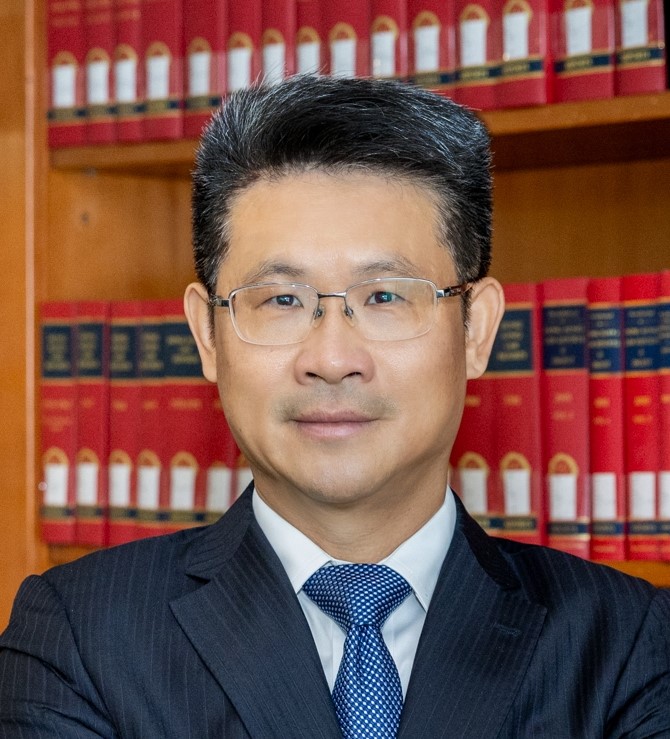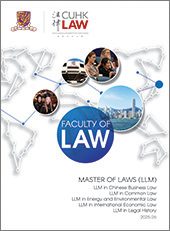Master of Laws (LLM) in Chinese Business Law
The LLM in Chinese Business Law Programme provides students with a structured course to study the principles, processes, institutions and methods of civil and commercial law in China in the context of an evolving political, economic and social environment. It is designed to enable students to develop a broad intellectual outlook on the legal aspects of doing business
CUHK LAW’s LLM in Chinese Business Law (CBL) Programme is eligible for the FTSS in the 2025/26 and/or 2026/27 intakes. Local students, both full-time and part-time, who are admitted to the CBL Programme in the above intake years are eligible to apply for FTSS. Applicants who have got an admission offer, accepted the offer and settled the admission deposit will be invited to submit applications. For details, please refer to Graduate School’s website.

| Medium of instruction: | English | ||||||||||||||||||
| How and when to apply: | Applications for 2026 intake will be invited around September of this year. | ||||||||||||||||||
| Admission requirements: | All applicants must fulfill the General Admission Requirements and the English Language Proficiency Requirement prescribed by the University’s In addition applicants must have:
As many areas of professional activity are related to law, we welcome applications from applicants who work in the areas of commerce, accountancy, social work, public administration, and similar Applicants whose undergraduate studies were not conducted and assessed in English are required to take an appropriate English language proficiency test and achieve a sufficient score, such as a score of 570 or above in TOEFL (Paper Based Test), 88 or above in TOEFL (Internet-Based Test); Band 6.5 or better in IELTS; or equivalent. The test results must be obtained not more than two years prior to the date of applying to join the LLM Programme. | ||||||||||||||||||
| Duration: | Full-time: one year (normative study period) – two years (maximum study period). Part-time: two years (normative study period) – three years (maximum study period). | ||||||||||||||||||
| Campus: | The CUHK Graduate Law Centre, 2/F, Bank of America Tower, Central. | ||||||||||||||||||
| Programme requirements: | 24 units: including 12 units of required courses and 12 units of elective courses. Students should pass all the assessments with a cumulative GPA of at least 2.0 in order to be recommended Study Sequence: Full-time mode (1 year)
Part-time mode (2 years)
| ||||||||||||||||||
| Delivery mode: | A 3-unit course will usually have three teaching hours per week. Classes are held during daytime and evenings of weekdays and daytime Classes will incorporate a mix of lectures, seminars, tutorials, presentations and | ||||||||||||||||||
| Study options: | Students may take elective courses offered in other LLM Programmes and the JD Programme offered by CUHK LAW subject to availability | ||||||||||||||||||
| Additional learning & development opportunities: | |||||||||||||||||||
| Tuition fees: | HK$6,880 per unit* for a total of 24 units within the normative study period. Students will be billed at the beginning of each term based on the number of units for which they have registered. Extra fees may be charged for students studying outside the normative study period. *subject to annual review | ||||||||||||||||||
| Further study options: | Master of Philosophy in Law (MPhil) or Doctor of Philosophy in Laws (PhD) | ||||||||||||||||||
| Student housing: | There is a shortage of on campus student accommodation for non-local postgraduate students. When relocating to Hong Kong students are advised they will need to rely on (readily-available) private off-campus accommodation during | ||||||||||||||||||
- Chinese Civil Law
- This course provides an overview of the key concepts, doctrines, and methods of contemporary Chinese civil law. With a focus on the general provisions of the Civil Code, it examines the application of civil law principles and doctrines in selected areas including personality rights, marriage and family, succession, and torts. Students will acquire a sound understanding of Chinese civil law in the socio-political and economic contexts of China since the reform era.
- Chinese Company Law
- The PRC Company Law was enacted to serve as a legal regime for business entities established in Mainland China in the form of companies limited by shares and joint stock companies. This course will give students an advanced understanding of the historical development of the PRC company law system in its cultural, political, and socio-economic context. It analyses the differences of available company types in Mainland China as well as their practical significance.
- Chinese Contract Law
- This course provides an overview of the fundamental concepts, doctrines and methods of Chinese contract law. It examines the general theory and concepts that underpin modern contract law in China and studies them in the context of China’s legal development since the reform era. The course focuses on a comparative understanding of Chinese contract law, especially in relation to common law and international uniform law.
- Legal System and Methods in China
- This course provides an overview of the history, structure, and basic principles of the legal system and method in the PRC. It examines the historical and cultural origin of contemporary Chinese law, the special characteristics that distinguish Chinese law from other major legal systems of the world, and the role of law in modern Chinese economy and society. The course serves as a foundation course for the study of more advanced courses on Chinese law.
- Chinese Accounting and Law
- Chinese Banking Law
- Chinese Civil Procedure Law
- Chinese Commercial Law
- Chinese Constitutional and Administrative Law
- Chinese Economy and Law
- Chinese Employment Law
- Chinese Environmental Law
- This course introduces environmental legal concepts, principles, and mechanisms in Chinese law. It examines the development and operation of Chinese environmental law with a focus on law-making, regulation, enforcement, and adjudication since the Reform era. The course further investigates China’s contribution to global environmental governance in response to climate change and ozone depletion among other great challenges facing the world today.
- Chinese Finance and Law
- Chinese Financial Law
- This course examines the history, structure, and development of Chinese financial legal system; considers the historical, political and economic context in which Chinese financial law has evolved and operated. Students will acquire a sound understanding of the role of financial law in China’s economic development and learn the skills essential to the study and practice of Chinese financial law, such as those for statutory interpretation, case analysis, legal research, and dispute resolution.
- Chinese Foreign Trade and Investment Law
- Chinese Intellectual Property Law
- This course approaches Chinese intellectual property law from a comparative perspective and in the light of the civil law approach to property and civil wrongs. It examines the principles underlying Chinese law with respect to registered trademarks, domain names, copyright, patents, design patents, trade secrets, and other sui generis legislation. Students will gain a critical understanding of these areas of the law and their place in modern Chinese society.
- Chinese Investment Law
- Investment law offers a rich and multidimensional perspective on the evolution of China’s post-Mao legal system in its broader economic, social and political context. This course is designed to provide a nuanced and contextualized overview of the law and practice of Chinese investment law, with a focus on the key doctrines, principles, institutions, policies, rules and practices of investment law that affect cross-border investments, both inward and outward.
- Chinese Law and Society in an Age of Digital Technologies and Artificial Intelligence
- Chinese Law Internship
- Chinese Politics and Law
- Chinese Practice on International Law
- Chinese Securities Regulation
- This course introduces students to different types of securities as well as economic and legal concepts governing capital markets. It analyses the development of the Mainland Chinese securities system. It also discusses special topics including restrictions that have been imposed on foreigners’ and foreign invested enterprises’ participation in the mainland capital markets and the procedure and practical significance of securities-related disputes in Mainland China.
- Chinese Tax Law
- Tax law often plays a very significant role when it comes to making business decisions in all jurisdictions including Mainland China. Students will acquire an in-depth understanding of the Mainland Chinese tax system. They will come to understand the historical development of the different PRC tax regimes and the political, cultural, economic, and social factors that have shaped and continue to shape the enactment and the implementation of related rules in practice.
- Criminal Justice and Society in China
- Dispute Resolution in China
- Global Issues in Law
- Private International Law in China
- Property Law in China
- This course studies the laws governing corporate financial transactions. While students will mainly learn about Chinese corporate law, regulatory rules, and tax law on these transactions, the course takes a comparative perspective and introduces similar rules in the United States, Europe, and Japan. Students will also explore how law affects the ownership structure of corporations and the basic logic of finance among many other theories of corporate finance.









- Innovation, Resilience and the Challenge of Covid-19 by Ms. Vivian Wu
- “Can We Trust Them with Our Money? Institutional Investors and Voting in China” by Prof. Chao XI
- Personality Rights under the Civil Code: Changes and Implications by Prof. Xie Lin
- NGOs and the Environmental Public Interest Litigation in China by Dr. Zhang Qing
Students of the CBL programme will have opportunities to visit local legal institutions including the Court of Final Appeal, the Independent Commission Against Corruption and the Hong Kong International Arbitration Centre. In the past, some of the CBL students had joined the Summer Study Abroad Programmes at Tsinghua University and the University of Sydney.
For newly admitted students/applicants
For current students
- Chinese Civil Law#
- Chinese Company Law#
- Chinese Contract Law#
- Legal System and Methods in China#
APPLICANTS
Yes. However, you can only study one programme at a time. Therefore, if more than one of your applications are successful you must choose only
No. The application fee once paid is
Yes. Any application received without the payment of the application fee will not be processed until the application fee
Yes. Students may apply for admission before completion of a Bachelor’s degree (or equivalent) provided that they are in the final year of study. In this situation any offer will be made subject to the condition that all requirements for graduation in the Bachelor’s degree (or equivalent) and for admission to the LLM programme are satisfied prior to commencing the
Yes. You can apply for admission to join a LLM programme before fulfilling the English Language Proficiency Requirement, but you must fulfill the Requirement and provide documentary proof prior to commencing the LLM programme. Any admission offer will be made conditional on you fulfilling the English Language
No. The Hong Kong Immigration Department has advised that in general it is unlikely that they will issue student visas to non-local applicants who intend to study part-time in Hong Kong. Therefore non-local students are strongly advised to study full-time in order to facilitate their student
Your official university transcript and confidential recommendations should be sent directly from your university and referees to CUHK LAW in
CUHK LAW selects applicants on the basis of academic merit. CUHK LAW welcomes applications from applicants around the world based upon the philosophy that diversity enriches the
No. However, applicants who do not possess a Bachelor’s degree (or equivalent) obtained in Hong Kong or in an English-speaking country are required to fulfill the English Language Proficiency Requirement of the
SUCCESSFUL APPLICANTS AND NEWLY-ADMITTED STUDENTS
No. On receipt of formal offers students will need to make their own arrangements for the payment of the deposit should they wish
Meanwhile, eligible local applicants may apply for financial support under Non-means-tested Loan Scheme from
Overseas students may check with organizations, government authorities etc, of their home countries if there is any financial
For information on other scholarships, please click here.
Application materials are disposed of after the end of each admission exercise. New applications will be
Newly admitted students are required to pay the tuition fees on or before the payment due date stated in the debit note in the admission package. Current students will receive a debit note at the beginning of each term, and are required to settle the tuition fees on or before the payment
Students who have not completed the programme requirements within the normative study period may apply to postpone the expected graduation date by submitting the Application Form for Change of Expected Graduation Date to CUHK LAW. The maximum extension is up to one year. The application is subject to the approval of CUHK LAW. The academic status of those students studying outside the normative study period will become “continuing”. Extra tuition fees may be charged for continuing students and the fee level for continuing student is subject to
Applicants should refer to the website of the Immigration Department for details concerning employment
| Tel: | (852) 3943 4310 |
| Fax: | (852) 2994 2505 |
| E-mail: | lawpgadm@cuhk.edu.hk |
| Address: | Faculty of Law 6/F, Lee Shau Kee Building The Chinese University of Hong Kong Shatin, New Territories Hong Kong |
What Our Students Say
"I have a background in both the Law and various Business fields. I chose to focus my career on China. As such, doing an LLM in Chinese Business Law at CUHK was the best decision I have ever made. The programme provided me with insight regarding Chinese business law. All of the professors and faculty members were very nice and internationally qualified. They were more than willing to help me enhance my legal knowledge and help prepare me for the professional world. I found the courses to be very practical and highly relevant to my career. In addition, the Graduate Law Center, where the courses are held, is located in a very convenient area in the business district of Hong Kong. Learning Chinese Business Law in Hong Kong, which is one of the world’s leading financial hubs and one of the leading economic hubs of Asia, was truly an invaluable experience for me."

"Having previously studied in a common law jurisdiction, the LLM in Chinese Business Law Programme has offered me an interesting comparison of how different legal systems would affect business decision-making in different countries. Importantly, the LLM exposes me not only to PRC law, but also to the principles of European continental laws.
Classes are always interactive and the professors are very approachable and supportive. On top of that, I really appreciate the diversified and refreshing assessment methods adopted in class such as mock client presentations, in which I was able to gain hands-on experience of the law in action rather than just the law on the books. In terms of personal development, I was also impressed by the variety of outside-the-classroom opportunities provided by CUHK such as mooting and career workshops. Overall, I believe the well-structured CBL Programme has equipped me with the necessary skills to pursue a first-rate career."

"Undertaking an LLM in Chinese Business Law has enabled me to better understand the financial and legal implications of the expanding trade and business relationship between China and the world. The professors are experts in their respective fields. They provided us with a rigorous understanding of the processes and principles of civil and commercial law in China. Moreover, they encouraged us to draw upon experiences from our respective countries and comparatively analyse the common law and civil law systems. Engaging in language exchange partnerships with my classmates in Mandarin and Cantonese even further enriched what has been a valuable experience."

"The LLM in Chinese Business Law has given me a deeper understanding of Chinese law and Chinese legal culture. It also helped me to better grasp the economic, political, and social implications of doing business in China. All professors were leading experts in their respective fields and encouraged the students to participate in class discussions. I appreciated the international and diverse learning environment at the Faculty, and I am happy to have made great friendships during my time here. The Faculty staff was very helpful and provided spectacular assistance to the international students. I was able to grow professionally and personally and I am very thankful for the time I spent at CUHK."

